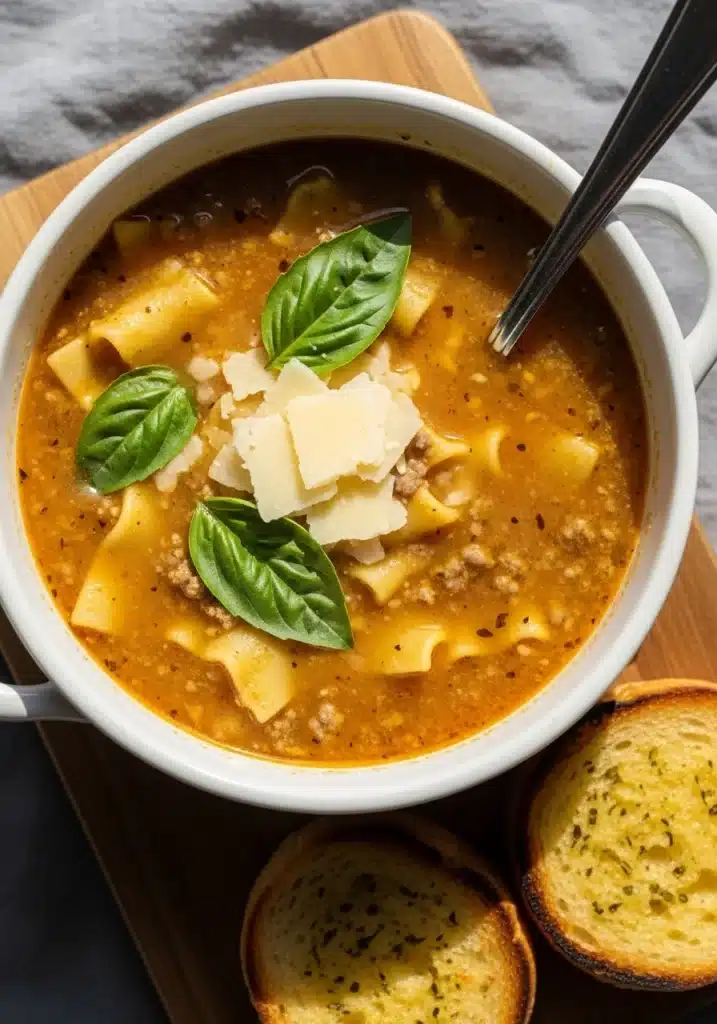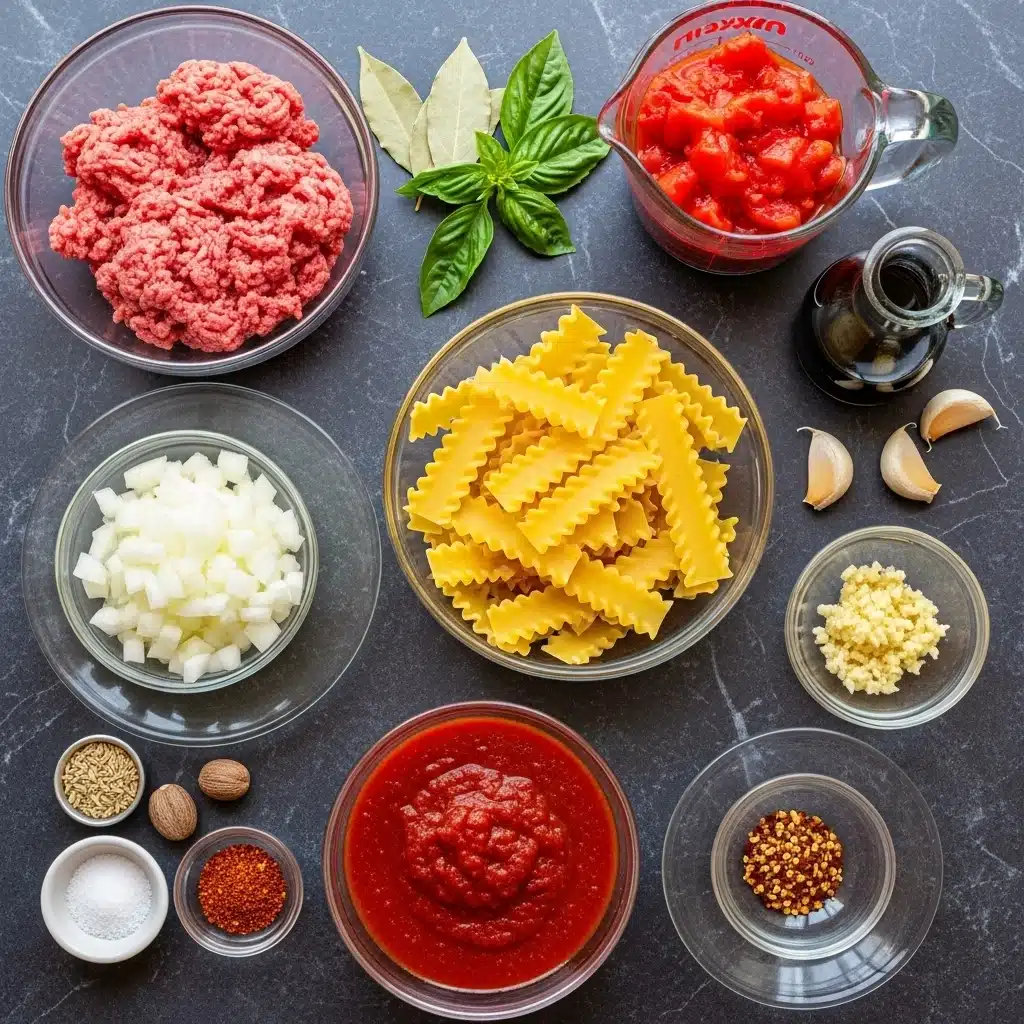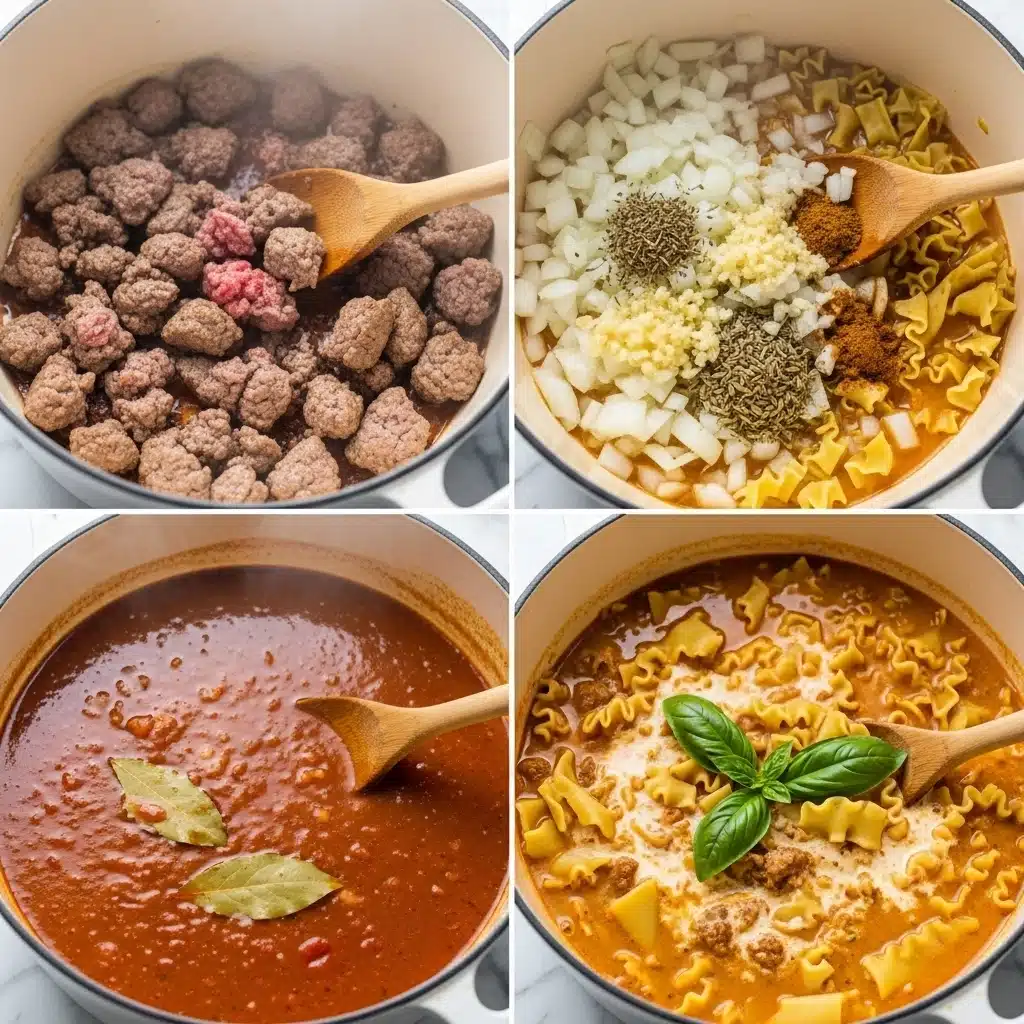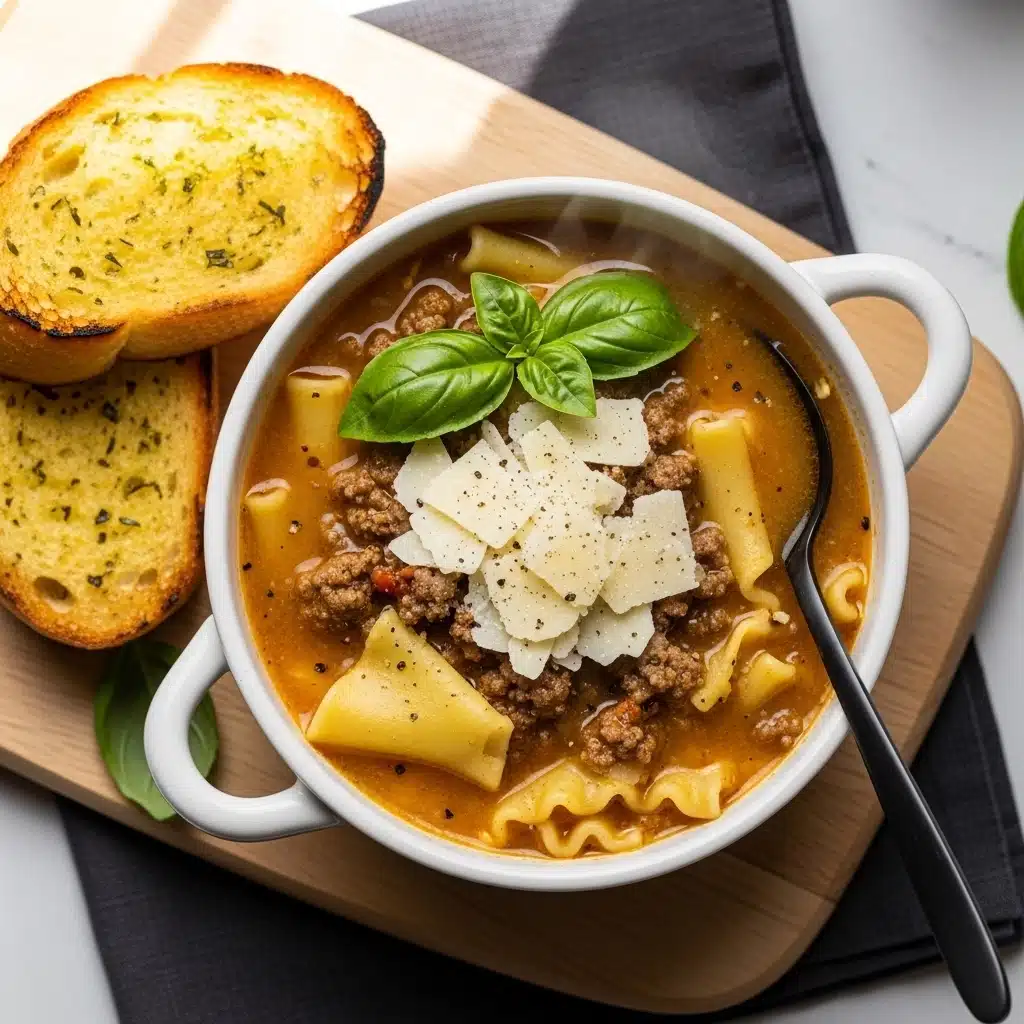Lasagna soup delivers all the cozy, rich flavors of traditional lasagna in a bowl—but with the secret ingredient most recipes skip: fennel seed and balsamic vinegar.

These create authentic depth that transforms your soup from “pretty good” to “unbelievably delicious.” Plus, I’ll teach you the pasta absorption science so your leftovers stay soup (not stew) for 5 days.
Jump to Section
Key Takeaways
- Fennel seed and balsamic vinegar are game-changers for authentic lasagna flavor depth—most recipes skip them entirely, which is why yours might taste flat
- Pasta absorption science matters: Engineering the right broth-to-noodle ratio means your soup stays soup for days, not turning into stew
- Marinara quality is everything: The jarred sauce you choose directly impacts whether your soup tastes homemade or watery-sweet
- Your creaming method determines texture: Heavy cream, ricotta, and cream cheese create completely different eating experiences
- Cooking method changes everything: Stovetop, Instant Pot, and slow cooker produce different flavor depths and noodle textures
- Pro tip: Check out my Cozy Creamy Tuscan Chicken Soup for another layered, restaurant-quality soup technique
Why You’ll Love This Lasagna Soup Recipe
- Tastes like homemade lasagna in a bowl, without the 2-hour assembly marathon
- Budget-friendly: Uses affordable pantry staples most families already have
- Ready in 30-40 minutes (or 6 hours on low in the slow cooker)
- Makes incredible leftovers: With proper storage technique, this soup actually improves by day 2 as flavors meld
- High-protein and satisfying: One bowl keeps you full for hours
- Freezer-friendly: Make a double batch and freeze in portions
- Customizable: Swap proteins, add vegetables, adjust creaminess
The Story Behind Lasagna Soup: Italian Inspiration Meets American Comfort
Lasagna soup exists at the beautiful intersection of Italian culinary tradition and American home cooking convenience. The genius isn’t new—it’s been floating around food blogs for years—but most versions miss the mark because they approach it like “lazy lasagna” instead of intentional soup.
Here’s what matters: Traditional Italian lasagna draws its depth from layered flavors built over time. The Bolognese sauce simmers for hours, allowing garlic, onion, and tomato to meld with subtle seasonings like fennel seed and nutmeg. That’s where most soup recipes fail. They rush through aromatics and skip the botanicals that make lasagna taste like lasagna.
Then there’s the marinara choice. I can taste the difference between a quality jarred sauce (like Rao’s, which uses San Marzano tomatoes and keeps sugar low) and budget options loaded with sugar. When you choose a good marinara, your soup tastes like someone spent all afternoon building flavors. Choose poorly, and you’ll taste watered-down sweetness.
This is where I learned the importance of ingredient selection—by testing dozens of variations and realizing that a few intentional choices separate “pretty good” from “people asking for the recipe.” My Cajun Potato Soup taught me the same lesson about layered seasoning, and I’ve applied those principles here.
Ingredients for Ultimate Lasagna Soup

Proteins:
- 1 lb Italian sausage (hot or sweet)
- 1 lb ground beef
Aromatics & Seasonings:
- 1 medium yellow onion, diced
- 4-5 garlic cloves, minced
- 1 tsp fennel seed (THE secret ingredient—creates licorice depth)
- 1½ tsp dried oregano
- 1 tsp dried basil
- ½ tsp red pepper flakes
- ⅛ tsp nutmeg (just a pinch—warmth and complexity)
- 2 bay leaves
Tomato Base:
- 1 (28 oz) can crushed tomatoes (San Marzano preferred)
- 1 (24 oz) jar marinara sauce (Rao’s preferred for lowest sugar)
- 1 tbsp balsamic vinegar
Liquid:
- 6 cups beef broth (low-sodium)
Pasta & Dairy:
- 8 oz lasagna noodles (broken into 1-2 inch pieces)
- ½ cup heavy cream
- ½ cup grated Parmesan cheese
Garnish:
- ¼ cup fresh basil, chopped
- Salt and black pepper to taste
Equipment Needed
- Large Dutch oven or heavy-bottomed pot (6-quart minimum)
- Wooden spoon for stirring
- Chef’s knife and cutting board
- Can opener
- Measuring cups and spoons
- Ladle for serving
Optional: Instant Pot for 15-minute version, slow cooker for 6-hour version
How to Make Lasagna Soup (Step-by-Step)

Step 1: Build the Aromatic Foundation
Heat your Dutch oven over medium-high heat. Add Italian sausage and ground beef, breaking it into small pieces as it cooks (about 5-7 minutes). Don’t skip the browning step—this develops flavor through the Maillard reaction. Drain excess fat, leaving about 2 tablespoons in the pot.
Step 2: Create Flavor Depth (The Secret Angle)
Add diced onion and cook 3-4 minutes until softened. Add minced garlic and cook 1 minute more. Here’s where most recipes fail: Add your fennel seed, dried oregano, dried basil, red pepper flakes, and just a pinch of nutmeg. Toast these spices for 30 seconds, stirring constantly. This awakens the oils and creates layers of flavor that replicate traditional lasagna. Add the bay leaves here too.
Step 3: Add Tomato Base
Pour in your crushed tomatoes and marinara sauce. Stir well, scraping the bottom of the pot to incorporate any browned bits. Let this simmer for 2-3 minutes so the tomato flavors marry with your spices.
Step 4: Add Broth and Build Liquid
Pour in 6 cups of beef broth. Stir in 1 tablespoon of balsamic vinegar (this balances acidity and adds subtle sweetness that mimics slow-cooked Bolognese). Bring to a gentle boil, then reduce heat to medium-low.
Step 5: Manage Pasta Absorption (Engineering Your Texture)
This is where pasta absorption science comes in. Add half of your broken lasagna noodles (4 oz). Simmer for 5 minutes, stirring occasionally. Add the remaining noodles and cook another 4-5 minutes until just tender but still with slight bite (al dente). This timing prevents mushy, overcooked pasta that continues absorbing liquid aggressively in storage.
Step 6: Cream and Season
Remove from heat. Stir in heavy cream until fully incorporated. Taste and adjust salt and pepper. Remove the bay leaves.
Step 7: Serve Immediately (or Cool for Storage)
Ladle into bowls. Top with fresh grated Parmesan and fresh basil. Serve with crusty bread for dipping.
Expert Tips for the Best Results
Master Pasta Absorption: Why Your Leftovers Turn Into Stew (And How to Fix It)
This is the biggest question I get: “Why does my lasagna soup get thick by day 3?” The answer is pasta starch breakdown. Lasagna noodles contain amylose and amylopectin (starch polymers) that hydrate and swell as they cook. The trick—they keep absorbing liquid for 3-5 days even when stored.
When you cook pasta to just al dente (tender with a slight bite), you’re stopping the cooking process at the perfect moment. But storage is where most people fail. The starch molecules continue absorbing water molecules through osmosis, expanding and thickening your broth into stew by day 2-3.
The Solution—Three-Part Strategy:
Part 1: Cook al dente (not soft). Tender on the outside with slight firmness in the very center. This is about controlling starch hydration timeline. An al dente noodle has reached optimal hydration without overshooting into aggressive absorption phase.
Part 2: Store strategically. Keep pasta and broth slightly separated if possible. Store in containers with just enough broth to cover noodles, rather than fully soupy. When you reheat, add fresh broth back in. This stops pasta absorption dead in its tracks.
Part 3: Reheat with extra liquid. Add ½ cup extra broth per 2-cup serving when reheating. Your first bowl feels “brothier” than your 3-day-old bowl—that’s intentional. You’re compensating for starch absorption that’s already happened.
Pro tip for make-ahead meals: Cook the meat sauce, broth, and spices completely. Store them together. Cook fresh lasagna noodles separately (in boiling water, salted, al dente) and add them only when ready to serve. This eliminates starch absorption issues entirely.
The Marinara Selection Guide: How to Avoid Watery, Overly-Sweet Soup
Not all jarred marinara is created equal. Here’s what separates good from mediocre:
Rao’s Marinara (my pick): San Marzano tomatoes, minimal sugar (6g per serving), balanced acidity. Costs $4-5 but makes noticeably better soup. Clean, intentional flavor.
Victoria (budget-friendly): Good quality, slightly more sugar (8g per serving), still tastes homemade. About $2-3 per jar. Works great if making soup regularly.
Barilla: Affordable, neutral flavor, slightly sweeter (10g sugar per serving). Around $2 per jar. Fine for most people.
Store brands: Variable quality. Check ingredient list and sugar content. Stay under 8g sugar per serving and look for “San Marzano” on the label if available.
Why it matters: Quality marinara uses whole tomatoes and minimal processing. Budget varieties add corn syrup and excessive tomato paste, creating sweet, flat taste that dominates your soup. One jar of good sauce ($5 max) means your soup tastes like someone spent serious time building flavors.
Creaming Methods: Heavy Cream vs. Ricotta vs. Cream Cheese
Heavy Cream (½ cup)
- Texture: Silky smooth, luxurious
- Flavor: Neutral—lets other flavors shine
- Best for: Traditional approach, richest mouthfeel, first-timers
- Use this for your first batch. It’s foolproof.
Ricotta Cheese (¾ cup)
- Texture: Slightly grainy, creamy, chunky in good way
- Flavor: Tangy, mild dairy, authentic Italian
- Best for: Traditional lasagna mimicry, lighter alternative, interesting texture
- Mix in at end. You’ll notice texture becomes slightly grainy (intentionally authentic) and soup tastes more like traditional Italian lasagna.
Cream Cheese (4 oz softened)
- Texture: Silky, slightly thick
- Flavor: Tangy, mild, subtle cheese
- Best for: Different eating experience, lighter eaters, unique flavor twist
- Whisk in off-heat. Creates different eating experience with subtle tang and different mouthfeel.
Cooking Method Mastery: Time, Flavor & Texture
Stovetop (30-40 minutes)
- Flavor: Medium (quick build)
- Noodle texture: Al dente, firm bite
- Best for: Immediate cravings, weeknight dinners
- Secret: Brown meat extra thoroughly (8-10 minutes). Get edges caramelized. Then simmer uncovered 5-10 minutes after soup comes to boil. This concentrates flavors.
Instant Pot (15 minutes)
- Flavor: Medium (compressed time)
- Noodle texture: Tender, slight softness
- Best for: Busy weeknights, people who like softer noodles
- Method: Sauté meat, add ingredients (no noodles), pressure cook high 8 minutes, quick release, add noodles sauté 3-4 minutes, add cream. Total: 20 minutes.
Slow Cooker (6-8 hours)
- Flavor: High (long simmer, deep flavor)
- Noodle texture: Very soft, breaking apart
- Best for: Sunday meal prep, maximum flavor
- Method: Brown meat first, add all except noodles and cream, cook low 6-8 hours, add noodles final 30 minutes (switch to high), add cream last 10 minutes.
What to Serve With Lasagna Soup

- Garlic bread: Butter, fresh minced garlic, fresh parsley on toasted baguette slices
- Crusty sourdough or ciabatta: For serious dipping and mopping up broth
- Simple green salad: Lemon vinaigrette cuts through richness beautifully
- Roasted vegetables: Zucchini, bell peppers add nutrition balance
- Grilled cheese sandwich: Dunked directly in the soup (comfort food squared)
My favorite pairing? Garlic bread and a crisp glass of Pinot Grigio—wine’s acidity cuts through cream and balances richness. For non-alcoholic: iced lemon water or unsweetened iced tea.
Want another soup option? My Creamy White Chicken Chili uses similar flavor-building techniques.
Storing and Reheating Tips
Refrigerator Storage: Store in airtight container up to 5 days. Soup actually tastes better on day 2-3 as flavors deepen. Because of pasta absorption, add ½ cup extra broth when reheating to restore consistency.
Freezing: Freeze up to 3 months in freezer bags or containers (leave ½-inch headspace). Thaw overnight in refrigerator. Pro tip: Freeze without noodles—cook fresh noodles when thawing to prevent mushiness.
Reheating Stovetop: Pour into pot, add ½ cup extra broth, simmer over medium heat 5-7 minutes, stirring occasionally.
Reheating Microwave: Transfer to microwave-safe bowl, add 2-3 tablespoons extra broth, microwave in 2-minute intervals (usually 4-6 minutes total).
Nutrition Facts
Per serving (1½ cups soup, assuming 6 servings):
Calories: 420 | Protein: 28g | Fat: 22g | Carbs: 28g | Fiber: 2g | Sodium: 1,180mg
Disclaimer: Nutrition information is estimated based on USDA database values. Actual nutrition varies based on specific brands used, cooking method, and portion size. This is not medical nutrition advice.
FAQs About Lasagna Soup
What ingredients are in lasagna soup?
Lasagna soup combines browned ground meat (beef and Italian sausage), diced onion, garlic, crushed tomatoes, marinara sauce, beef broth, broken lasagna noodles, and heavy cream. The secret? Fennel seed, nutmeg, and balsamic vinegar create authentic Bolognese depth. Top with fresh grated Parmesan and fresh basil.
What is “lazy lasagna”?
Lazy lasagna (or lasagna soup) skips labor-intensive layering and baking of traditional lasagna. You build the same flavors through stovetop simmer instead. Same delicious comfort food result, 75% less effort, zero dirty baking dishes.
Does lasagna soup need heavy cream?
Not necessarily. Heavy cream adds richness and silky texture, but it’s optional. Try ricotta cheese (¾ cup) mixed in for traditional Italian take with more interesting texture, or cream cheese (4 oz softened) for tangy alternative. Some people skip dairy entirely for lighter, brothier version.
What do you eat with lasagna soup?
Garlic bread is traditional and essential. Crusty sourdough or ciabatta for dipping works beautifully. Side salad with lemon vinaigrette cuts through richness. Roasted vegetables add nutrition balance. My personal favorite? Grilled cheese sandwich dunked right in the bowl.
What goes on top of lasagna soup?
Fresh grated Parmesan is standard. Fresh basil adds brightness. Red pepper flakes for heat, or balsamic vinegar drizzle for depth. Some people add dollop of ricotta on top for extra creaminess (especially pretty for guests).
Is lasagna soup healthy?
One serving delivers about 28g protein, making it satisfying and nutrition-dense. It’s higher in fat and sodium due to cream and broth, so portion mindfully if watching calories or sodium. Add extra vegetables (spinach, mushrooms, zucchini) to boost fiber and nutrition without changing recipe.
Can you make lasagna soup in an Instant Pot?
Yes! Brown meat on sauté function first (caramelize edges), add remaining ingredients (no noodles), pressure cook high 8 minutes, quick release, add noodles, sauté 3-4 minutes until al dente, add cream off-heat. Total: 20 minutes. Flavor develops less than stovetop but perfect for busy weeknights.
Final Thoughts
Lasagna soup is proof that the best comfort food doesn’t require hours in the kitchen. What it does require is attention to detail—the right seasonings (fennel seed), quality ingredients (marinara matters), and understanding the science behind what makes your leftovers stay soup, not stew.
I created this recipe after testing dozens of versions and realizing that most were missing the depth and intentionality of real lasagna. Now when I make it, people genuinely can’t believe it came together in 40 minutes. That’s the magic of layered flavor and confident technique.
Make this soup, taste it on day 3 when the flavors have mellowed and married, and tell me this isn’t your new favorite weeknight dinner. And if you want to explore more layered, restaurant-quality soup techniques, check out my Slow Cooker Honey Garlic Chicken—same attention to depth and flavor building, completely different profile.
Happy cooking, and enjoy every spoonful. You’ve earned it.
“Pin this recipe and follow us on Facebook & Pinterest for endless inspiration.”

Lasagna Soup Recipe
Ingredients
Method
- Heat Dutch oven over medium-high heat. Add Italian sausage and ground beef, breaking into small pieces as it cooks (5-7 minutes). Drain excess fat, leaving about 2 tablespoons.
- Add diced onion, cook 3-4 minutes until softened. Add minced garlic, cook 1 minute. Add fennel seed, oregano, basil, red pepper flakes, nutmeg, and bay leaves. Toast for 30 seconds, stirring constantly. This awakens the oils and creates layers of flavor that replicate traditional lasagna.
- Pour in crushed tomatoes and marinara sauce. Stir well, scraping bottom of pot. Let this simmer for 2-3 minutes so the tomato flavors marry with your spices.
- Pour in 6 cups of beef broth. Stir in 1 tablespoon of balsamic vinegar (this balances acidity and adds subtle sweetness that mimics slow-cooked Bolognese). Bring to a gentle boil, then reduce heat to medium-low.
- Add half of your broken lasagna noodles (4 oz). Simmer for 5 minutes, stirring occasionally. Add the remaining noodles and cook another 4-5 minutes until just tender but still with slight bite (al dente). This timing prevents mushy, overcooked pasta that continues absorbing liquid aggressively in storage.
- Remove from heat. Stir in heavy cream until fully incorporated. Taste and adjust salt and pepper. Remove the bay leaves.
- Ladle into bowls. Top with fresh grated Parmesan and fresh basil. Serve with crusty bread for dipping.
